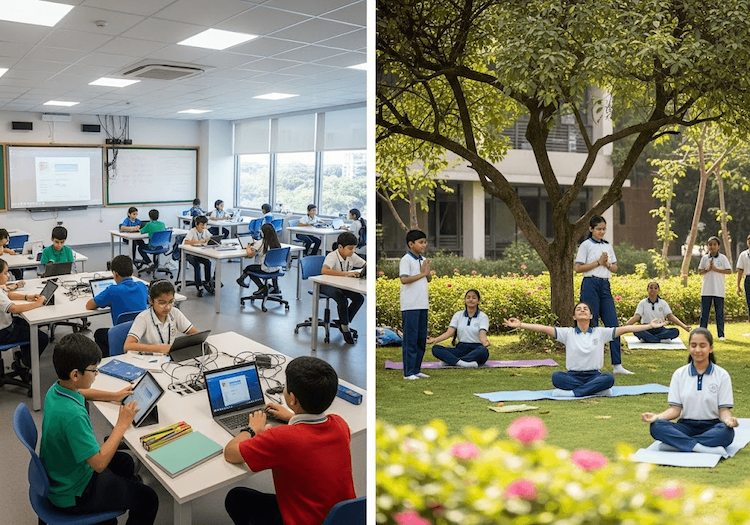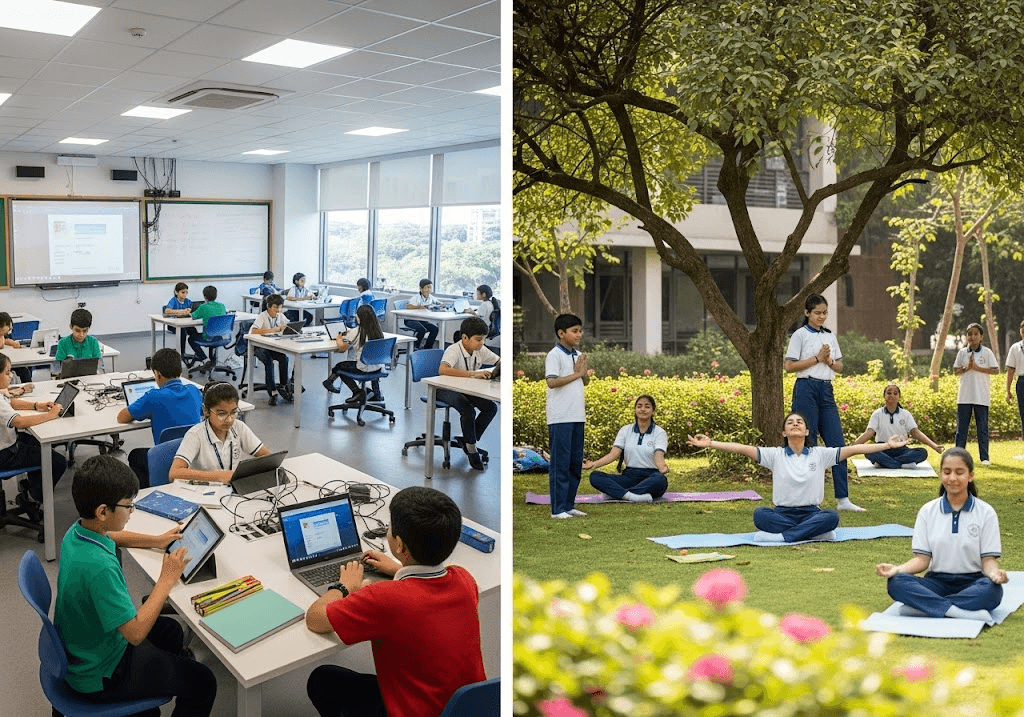
What Makes the Best CBSE Schools in Hyderabad Stand Out? Expert Guide for Parents

What Makes the Best CBSE Schools in Hyderabad Stand Out? Expert Guide for Parents
Choosing the right school for your child is one of the most crucial decisions you'll make as a parent. With Hyderabad emerging as a major educational hub, parents have access to numerous quality institutions, but what truly distinguishes the Best CBSE Schools in Hyderabad from the rest? Having explored the educational landscape extensively, we've uncovered the key factors that make certain schools exceptional choices for discerning families.
The competition among educational institutions has intensified dramatically, pushing schools to innovate and excel across multiple dimensions. Parents today seek more than just good grades; they want schools that nurture well-rounded individuals prepared for tomorrow's challenges.
1. Proven Track Record of Academic Excellence
The foundation of any exceptional school lies in its academic achievements. Leading institutions consistently demonstrate:
- Outstanding board results with students achieving 90%+ scores across subjects
- High success rates in competitive entrance exams like JEE, NEET, and CLAT
- Recognition and awards from educational bodies and government institutions
- Alumni success stories spanning diverse professional fields
- Consistent improvement in academic performance year over year
Top Residential Schools in Hyderabad particularly excel in creating focused academic environments where students can concentrate without external distractions, often resulting in superior performance metrics.
2. Experienced and Student-Centric Faculty
Quality education starts with quality educators. The best schools prioritize:
- Highly qualified teachers with relevant subject expertise and advanced degrees
- Regular professional development programs to keep faculty updated with latest pedagogical methods
- Low student-teacher ratios ensuring personalized attention (typically 1:15 or better)
- Mentorship programs where teachers guide students beyond academics
- Innovation in teaching methods incorporating interactive and experiential learning
Teachers in exceptional schools don't just deliver curriculum – they inspire, motivate, and adapt their teaching styles to individual learning preferences.
3. Modern Infrastructure and Learning Facilities
Contemporary educational facilities significantly impact learning outcomes:
- Smart classrooms equipped with interactive whiteboards and digital learning tools
- Well-equipped laboratories for practical science learning and experimentation
- Comprehensive libraries with both physical and digital resources
- Advanced sports facilities including swimming pools, courts, and fields
- Technology centers with computer labs and maker spaces for hands-on learning
- Safe transportation systems with GPS tracking and trained staff
Infrastructure investments reflect a school's commitment to providing students with every tool needed for holistic development.
4. Wide Range of Co-Curricular Activities
Exceptional schools understand that education extends beyond textbooks:
- Diverse sports programs from traditional games to international sports
- Arts and creativity including music, dance, drama, and visual arts
- Leadership opportunities through student councils, house systems, and peer mentoring
- Community service projects fostering social responsibility and empathy
- Cultural events and competitions celebrating diversity and talent
- International exchange programs broadening global perspectives
These activities develop crucial life skills including teamwork, leadership, time management, and creative problem-solving.
5. Strong Focus on Student Safety and Wellbeing
Student welfare remains paramount in top-tier institutions:
- Comprehensive safety protocols including CCTV monitoring and controlled access
- Anti-bullying policies with clear reporting mechanisms and swift action
- Counseling services providing emotional and psychological support
- Health and medical facilities with qualified nurses and tie-ups with nearby hospitals
- Emergency response systems ensuring quick action during any crisis
- Regular safety drills preparing students for various emergency scenarios
Parents can have peace of mind knowing their children are in secure, caring environments that prioritize wellbeing alongside academic growth.
6. Technology-Integrated Learning
Modern educational approaches leverage technology effectively:
- Digital learning platforms enabling personalized learning paths
- Online assessment tools providing immediate feedback and progress tracking
- Virtual reality experiences making abstract concepts tangible and engaging
- Coding and robotics programs preparing students for the digital future
- Parent communication apps keeping families informed about student progress
- Hybrid learning capabilities ensuring continuity during any disruptions
Technology integration isn't just about having devices, it's about using them purposefully to enhance learning outcomes.
7. Holistic Development and Value-Based Education
The finest institutions focus on character building alongside academic achievement:
- Moral and ethical education instilling strong values and integrity
- Environmental consciousness through sustainability programs and green initiatives
- Global citizenship programs promoting cultural awareness and social responsibility
- Life skills training including financial literacy, communication skills, and critical thinking
- Career guidance and counseling helping students make informed future choices
- Regular parent-teacher interactions ensuring alignment between home and school values
This comprehensive approach ensures students graduate as confident, capable, and compassionate individuals ready to make positive contributions to society.
Making the Right Choice for Your Child
When evaluating potential schools, visit campuses, interact with faculty and current parents, and observe the school culture firsthand. The best schools welcome such scrutiny because they're proud of what they offer.
Consider your child's specific needs, interests, and learning style. What works for one student might not be ideal for another. Look for schools that demonstrate flexibility and willingness to adapt to individual requirements.
At Sri Sri Academy, we understand these expectations and strive to exceed them consistently. Our commitment to excellence across all these dimensions has helped countless students achieve their dreams while developing into well-rounded individuals.
The educational journey is a marathon, not a sprint. Choose institutions that will support your child's growth throughout their academic career, providing the foundation for lifelong success and happiness.
Frequently Asked Questions
Q1: What should I look for when visiting potential CBSE schools in Hyderabad?
Pay attention to the cleanliness and maintenance of facilities, observe student-teacher interactions, check the availability of specialized rooms like labs and libraries, and assess the overall atmosphere. Don't hesitate to ask about academic results, safety measures, and extracurricular opportunities.
Q2: How important is the student-teacher ratio in determining school quality? Student-teacher ratio is crucial as it directly impacts the individual attention each child receives. The best schools maintain ratios of 1:15 or lower, allowing teachers to understand each student's strengths, weaknesses, and learning preferences better.
Q3: Are residential schools better than day schools for CBSE education?
Both have advantages. Residential schools offer focused learning environments, better time management, and independence development. Day schools allow more family interaction and flexibility. The choice depends on your child's personality, family circumstances, and specific needs.
Q4: How can I assess the quality of faculty in a prospective school?
Ask about teacher qualifications, experience levels, training programs, and turnover rates. Request to observe a few classes if possible. Quality schools are transparent about their hiring standards and professional development initiatives.
Q5: What role does infrastructure play in my child's education?
Modern infrastructure supports diverse learning styles and provides practical exposure to technology and facilities that enhance understanding. However, remember that excellent teaching can happen anywhere, infrastructure should complement, not replace, good pedagogy.
Q6: How do top CBSE schools in Hyderabad prepare students for competitive exams? Leading schools integrate competitive exam preparation into their curriculum, offer specialized coaching sessions, provide mock tests, and maintain partnerships with coaching institutes. They also focus on conceptual clarity rather than rote learning.
Q7: What should I expect in terms of communication with the school?
Excellent schools maintain regular communication through multiple channels parent-teacher meetings, digital platforms, newsletters, and emergency communication systems. They should be responsive to parent queries and provide regular updates on student progress and school activities.
